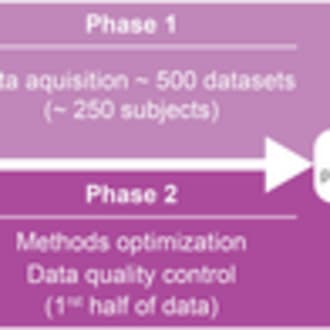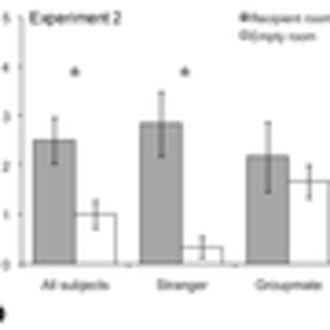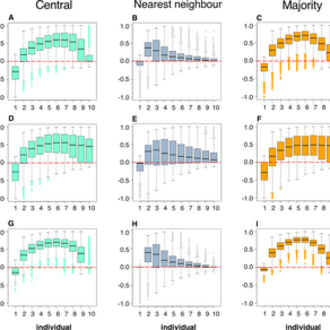The Best of PLOS
10+ most popular PLOS articles, as voted by our community.
PLOS on Conspiracy Theories
Have beliefs in conspiracy theories increased over time?
The public is convinced that beliefs in conspiracy theories are increasing, and many scholars, journalists, and policymakers agree. Given the associations between conspiracy theories and many non…
PLOS on Future Of Work
An adversarial collaboration protocol for testing contrasting predictions of global neuronal workspace and integrated information theory
The relationship between conscious experience and brain activity has intrigued scientists and philosophers for centuries. In the last decades, several theories have suggested different accounts for…
PLOS on Nature
Chimpanzees Help Each Other upon Request
Background The evolution of altruism has been explained mainly from ultimate perspectives. However, it remains to be investigated from a proximate point of view how and in which situations such social…
Bonobos Share with Strangers
Humans are thought to possess a unique proclivity to share with others – including strangers. This puzzling phenomenon has led many to suggest that sharing with strangers originates from human-unique…
PLOS on Psychology
Personality variation is eroded by simple social behaviours in collective foragers
Author summary The movement of groups can be heavily influenced by ‘leader’ individuals who differ from the others in some way. A major source of differences between individuals is the repeatability…
PLOS on Sleep
Recommendations for daytime, evening, and nighttime indoor light exposure to best support physiology, sleep, and wakefulness in…
Light exposure influences human health and wellbeing by modulating circadian rhythms and sleep. This Consensus View outlines the first expert scientific consensus recommendations for appropriate daily…
Sleep prevents catastrophic forgetting in spiking neural networks by forming a joint synaptic weight representation
Author summary Artificial neural networks can achieve superhuman performance in many domains. Despite these advances, these networks fail in sequential learning; they achieve optimal performance on…
«the brain learns continuously, and typically learns best when new training is interleaved with periods of sleep for memory consolidation.»
Popular
These are some all-time favorites with Refind users.
Predicting dementia from spontaneous speech using large language models
Author summary Alzheimer’s disease is a currently incurable brain disorder. Speech, a quintessentially human ability, has emerged as an important biomarker of neurodegenerative disorders like AD. Can…
Hangry in the field: An experience sampling study on the impact of hunger on anger, irritability, and…
The colloquial term “hangry” refers to the notion that people become angry when hungry, but very little research has directly determined the extent to which the relationship between hunger and…
Intact but empty forests? Patterns of hunting-induced mammal defaunation in the tropics
This study estimates that roughly half of the tropics contain defaunated populations of medium and large mammal species as a result of hunting pressure; hunting effects are so pervasive that even…
Tyrant Dinosaur Evolution Tracks the Rise and Fall of Late Cretaceous Oceans
The Late Cretaceous (∼95–66 million years ago) western North American landmass of Laramidia displayed heightened non-marine vertebrate diversity and intracontinental regionalism relative to other…
Airbnb and neighborhood crime: The incursion of tourists or the erosion of local social dynamics?
The proliferation of internet-based home-sharing platforms like Airbnb has raised heated debates, with many in the general public believing that the presence of Airbnb listings can lead to an increase…
What is Refind?
Every day Refind picks the most relevant links from around the web for you. is one of more than 10k sources we monitor.
How does Refind curate?
It’s a mix of human and algorithmic curation, following a number of steps:
- We monitor 10k+ sources and 1k+ thought leaders on hundreds of topics—publications, blogs, news sites, newsletters, Substack, Medium, Twitter, etc.
- In addition, our users save links from around the web using our Save buttons and our extensions.
- Our algorithm processes 100k+ new links every day and uses external signals to find the most relevant ones, focusing on timeless pieces.
- Our community of active users gets the most relevant links every day, tailored to their interests. They provide feedback via implicit and explicit signals: open, read, listen, share, mark as read, read later, «More/less like this», etc.
- Our algorithm uses these internal signals to refine the selection.
- In addition, we have expert curators who manually curate niche topics.
The result: lists of the best and most useful articles on hundreds of topics.
How does Refind detect «timeless» pieces?
We focus on pieces with long shelf-lives—not news. We determine «timelessness» via a number of metrics, for example, the consumption pattern of links over time.
How many sources does Refind monitor?
We monitor 10k+ content sources on hundreds of topics—publications, blogs, news sites, newsletters, Substack, Medium, Twitter, etc.
Can I submit a link?
Indirectly, by using Refind and saving links from outside (e.g., via our extensions).
How can I report a problem?
When you’re logged-in, you can flag any link via the «More» (...) menu. You can also report problems via email to hello@refind.com
Who uses Refind?
450k+ smart people start their day with Refind. To learn something new. To get inspired. To move forward. Our apps have a 4.9/5 rating.
Is Refind free?
Yes, it’s free!
How can I sign up?
Head over to our homepage and sign up by email or with your Twitter or Google account.











